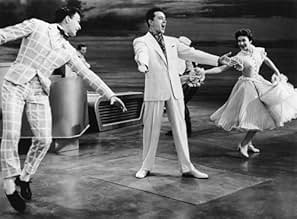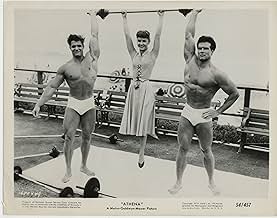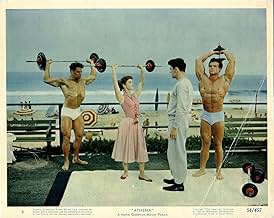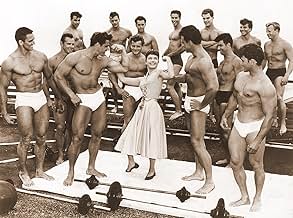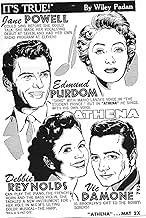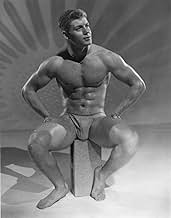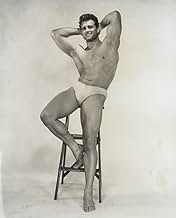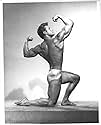Athena
- 1954
- Tous publics
- 1h 35m
The story about two sisters in love. Everything should be wonderful, but father doesn't approve of his daughters' physically underdeveloped fiancés.The story about two sisters in love. Everything should be wonderful, but father doesn't approve of his daughters' physically underdeveloped fiancés.The story about two sisters in love. Everything should be wonderful, but father doesn't approve of his daughters' physically underdeveloped fiancés.
- Ed Perkins
- (as Steve Reeves "Mr. Universe" of 1950)
Featured reviews
HOWEVER--- this is a relatively minor quibble when compared to the delights which seem to tumble forth from this silly, quirky, but immensely enjoyable romp. And Martin and Blane's score, while a bit meager in terms of the number of songs which it contains, is TOP-NOTCH.
The opening credits feature the lush title-song "Athena", in the quintessential "exotica/lounge" idiom (complete with MGM's expert chorus), so much a part of the 1950's pop-culture. This song functions solely as "presentation" music and is never actually sung in the film.
Then there's "VOCALIZE/HARMONIZE", a robust, life-affirming waltz that features Hugh Martin's distinctive and novel melody and harmonic progressions. It is very sophisticated, and several cuts above what one normally encounters in the average film musical.
"IMAGINE" is also very intriguing in its musical language; it's essentially a light-jazz "Swing" ballad but again, it's far from ordinary, since it's melody and blues-inspired harmonies continually shift when you least expect them to. Beautifully crafted stuff, especially when carried by Blane's clever lyrics.
"LOVE CAN CHANGE THE STARS" is the score's major romantic ballad, and it is superb. Again, it is anything but predictable in musical terms, but it is utterly, exquisitely logical and beautifully shaped, to boot. MGM's legendary, lush "house" orchestration *(see below)is delicate and shimmery, and demonstrates a phenomenal command of orchestral color.
The Rhino Handmade CD of the ATHENA soundtrack contains the original demos of all of the songs, performed by Ralph Blane (vocal) and Hugh Martin (piano); they are a JOY to listen to (though sometimes Mr. Blane's upper vocal register gets a bit annoying). If you enjoy this score, you really must hear the songs as performed by their creators. I would go so far as to say that the final portion of their piano/vocal rendition of "Love Can Change the Stars" elevates it to the level of Kurt Weill's Broadway ballads-- seriously....it's that good.
"I NEVER FELT BETTER" is another musical marvel. Ralph Blane's lyrics must be heard to be believed; the amazing Johnny Mercer could not have produced anything wittier and more inventive than Blane's lyrics for this tune. It's dazzling, as is the on screen choreography (uncredited!?!), which must have taken three weeks to rehearse, since it was mostly filmed in L-O-N-G, extremely intricate takes.
Then there's VENEZIA, obviously written to showcase the incomparable singing of Vic Damone (since the song serves no dramatic function in the film). But it's SO lovely, especially since its dark, chromatic musical language creates an exotic, wistful quality that is both alluring and sentimental. Add to it the stunning arrangement and orchestration by Albert Sendrey (another of the unsung musical masters who labored uncredited on MGM's staff) which practically drips with luxuriant color (not to mention Jeff Alexander's choral background), and you have another superb example of the Hollywood musical artistry at its height.
Again, the true beauty of VENEZIA is only revealed on the Rhino CD release, which is in the original 1954 optical stereo, amazingly rich, full-bodied and detailed; it sounds as good as anything that's been recorded since. Happily, the audio quality of the DVD soundtrack is also excellent.
* (How deplorable and unjust that MGM arranger and orchestrator Albert Sendry, whose superb work is heard in the Main Title, "Vocalize", "Love Can Change the Stars" and "Venezia" received NO screen credit, while Robert van Eps, who produced mostly shorter, incidental numbers in the score, was listed in the opening credits as sole orchestrator. A raw deal if there ever was one).
Just one more comment about the film itself: most of the script is quite well written. The dialogue is snappy and clever, and I continually crack up at stuffy, stick-in-the-mud lawyer Edmund Purdom as he deals with a continual stream of vexing, annoying and confusing situations. His big dialogue scene with the irrepressible Louis Calhern in the Mulvain family gym is truly funny.
"SINGIN' IN THE RAIN" is definitely the more classic musical when compared to "ATHENA"---what Gene Kelly and Donald O'Connor accomplished on screen was in a class by itself----but I will be so bold as to say that "ATHENA'S score is the better of the two.
So sue me.
ATHENA is definitely worth getting to know. It's a unique piece of our Hollywood film-musical heritage, and cannot be allowed to remain in oblivion. Check it out-- I guarantee that, after listening to these delightful,enchanting tunes a few times, you will NOT be able to get them out of your head for days.
LR
PS-- The charming and supremely talented Vic Damone is 88 years old today (JUNE 12, 2016).
This 60+ year old film humorously but respectfully presents the Southern-California health culture of the mid-1950's, that was still considered by many to be way-out and crazy - including vegetarianism, strenuous exercise, bikes vs. Cars, and body building.
The songs by Hugh Martin and Ralph Blaine are fantastic, including the lovely "Love Can Change the Stars", with its wonderful, unusual rhymes, and "I Never Felt Better," an energetic number headlined by Debbie Reynolds and Powell, and choreographed (as is the whole film) by Valerie Bettis.
Another great tune is Vocalize, first sung by Jane as she mulches some peach trees, and reprised several times.
The bodybuilders (Steve Reeves, Richard DuBois, et al) mostly come off as jerks, which I guess was necessary to the plot, so that the "regular" guys can get the best of them, but it's a bit unfair. By the end of the film there's harmony between all parties - not really adequately explained, but hey, it's not War And Peace, it's just an MGM musical, and a fun one.
Edmund Purdom is handsome, quietly charming, and appropriately stiff as the lawyer who loves Athena, but when he's supposed to be loosening up, well, he's still maybe a bit stiff. Vic Damone, in the second lead, plays a TV crooner who woos Debbie and has a couple of numbers to showcase his superb skills, including a reworking of "The Boy (Girl) Next Door" from Meet Me In St. Louis, and "Venezia," which has nothing to do with the plot (it's sung in a nightclub act) but is another terrific song by Martin-Blaine. The lovely and very talented Jane also gets to sing the obligatory classical piece (from Donizetti's "Daughter Of The Regiment") and really sells it. All in all, the musical interludes are legit, and make the picture one of the more truly enjoyable MGM musical shows.
The supporting actors in the film are great, especially Louis Calhern as the 78 year old grandfather who can still do gymnastics (Calhern was actually in his late 50's); Evelyn Varden ("I love you, let us be friends") as Grandma, who communes with a spirit called Narda; Ray Collins, Carl Benton Reid, and Howard Wendell as the three older law partners urging Purdom to maintain his dignity; the wonderful Kathleen Freeman as Purdom's stuffy secretary (who starts out eating chocolates and winds up munching on a raw carrot); and the subtly bitchy Linda Christian, who is so good as Athena's blue blood adversary you somehow can't quite hate her as much as you should. Also in the cast are the lovely actress-singer Virginia Gibson, as well as talented Nancy Kilgas, both of whom were also in "Seven Brides For Seven Brothers" (1954) with Jane. Also delightful is Henry Nakamura (you may remember him from "Westward The Women", or "Go For Broke") as Purdom's houseboy, who informs his boss that Powell speaks Japanese with a Spanish accent.
The settings are imaginative and expertly realized, especially the modernistic hilltop home of the Mulvains, and the vocal, orchestral and choral arrangements are fantastic.
There is just something fresh and likable about the movie, its setting, characters, tunes, and dances. Sadly, the era of the MGM musicals was on the wane when this one was made. Jane Powell's film career didn't survive her departure from the studio, though Debbie Reynolds became an even bigger star over then next ten years.
Jane is as pretty as ever, in overlit but warmly rich Eastmancolor, chirrupping in her matchless colortura; Debbie Reynolds lends her usual lively support; Vic Damone, despite his eminently listenable baritone, once again demonstrates why he never became a top boxoffice draw; and Edmund Purdom is perfectly cast as an unlikely stuffed-shirt suitor to Jane's way-out-there Athena. One can only imagine the chasm of misunderstandings that would bedevil their future marital bliss. With the elegant Louis Calhern as an unlikely patriarch, health and fitness obsessed, and the lovable Evelyn Varden as his woozy mate, convinced that astrology is the key to happiness. Add a passel of pre-steroid Muscle Beach denizens, including the handsome Steve Reeves and Ed Fury, before their emigration to Italy to appear in all those Hercules epics, and you've got a brew that's not really indigestible but doesn't really coalesce as its makers may have hoped.
The premiere member of this elite group was a former Mr. Universe--the dark, statuesque Steve Reeves. Before the days when he was sporting a leather loincloth, chained at the wrists, tensing his biceps, and literally bringing the house down, Reeves was introduced for the public's delectation in the 1954 musical "Athena." In it, he plays Ed Perkins, the prize stallion of a stable of physical culturalists groomed by the barrel-chested Louis Calhern--handlebar moustache, bluster and all--as Ulysses Mulvain, a septagenarian who espouses to a neo-Spartan approach to life, replete with vegetarian diet, and plenty of fresh air and exercise. Reeves vies for the affection of the title character, Mulvain's granddaughter (Jane Powell), who, much to the chagrin of the "stars," has eyes for a stuffy, young lawyer (played by the impossibly handsome Edmund Purdom--if there ever was an actor with a silky-milky-white complexion, it's him), himself being primed and tweaked for a U.S. senate seat. Reeves settles for a supporting role in his first major outing on the screen and sits on the sidelines while Powell charts her inevitable course with Purdom glowering at her incessantly. The body beautiful has his big scene with taking the title at a re-creation of the Mr. Universe contest that for insiders must have seemed pretty hokey.
That aside, if you're willing to go with it, "Athena" can be fun--a kind of stilted mixture of numerology, prurient interest, and music--all served up by the not-so-discerning minds of writers William Ludwig ("The Student Prince"), Leonard Spigelgass, and the by-then renowned songwriting team of Hugh Martin and Ralph Blane. Their classic "The Boy Next Door" changes sex with Vic Damone singing it, and their "Love Can Change The Stars" is just syrupy enough for the sweet tooths of hopeless romantics. (My favorite is the spry "I Never Felt Better.") But none of these compares with the grandeur of blazingly blonde Powell's rendition of "Chacun Le Sait" from Donizetti's "La Fille du Regiment." It's full of passion and indignation and fire, and Powell has never achieved so high a note of glory on screen as she has in these few much-too-short minutes.
Also on the sidelines--Debbie Reynolds as Athena's sister Minerva, and, descending from the clouds of Hollywood movie mysticism, Evelyn Varden as Salome Mulvain, grandmother of the nymphs, greeting everyone with something that sounds like "Namari gongo par" and coming out trances every so often to bestow upon her loved ones the will of the stars.
To those on the "outside", like the characters played by Vic Damone and Edmund Purdom, this can be confusing or kooky. But there is no denying the allure of these comely beauties who also happen to be surrounded by bodybuilding hunks like Steve Reeves.
This quirky film falls under the musical comedy umbrella, but it seems to offer something different---an outlook on the world. Although it bears a resemblance to another film released in 1954---"Seven Brides for Seven Brothers", its depiction of an alternate culture separate from the rest of the world is similar to another film musical released that year: "Brigadoon".
The unique soundtrack includes songs by Martin and Blane that fit the unusual narrative and allow the cast to demonstrate their vocal talents.
This film is not for everyone, but I find it charming and enjoyable.
Did you know
- TriviaWhen the daughter of Italian director Pietro Francisci saw this film, she suggested bodybuilder-turned-actor 'Steve Reeves' for the title role in her father's upcoming production Les travaux d'Hercule (1958) (US title: "Hercules").
- GoofsRight before Debbie Reynolds and Vic Damone go into the musical number in the health store, the microphone shadow passes over the cardboard cutout of the counter top muscle man advertising Viatalo.
- Quotes
Adam Calhorn Shaw: You earned $300,000? Now, let's start from the beginning, just what did you do to earn all this money?
Johnny Nyle: I sing in television, radio, records, night clubs.
Adam Calhorn Shaw: You get all that money singing?
Johnny Nyle: I guess you wouldn't call it singing. I'm a - a crooner.
Adam Calhorn Shaw: There ought to be a law against that.
- How long is Athena?Powered by Alexa
Details
- Release date
- Country of origin
- Languages
- Also known as
- Yeni ilahlar
- Filming locations
- Production company
- See more company credits at IMDbPro
- Runtime
- 1h 35m(95 min)
- Aspect ratio
- 1.75 : 1


